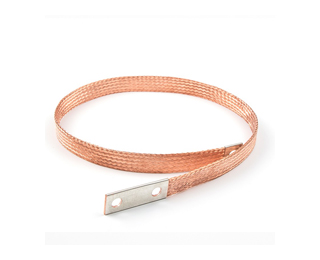2025-02-20 17:59:20
Flexible Braided Copper Busbars are essential components in various electrical systems, thanks to their excellent conductivity, flexibility, and ability to handle demanding applications. A common question regarding these busbars is whether they can withstand high temperatures and heavy electrical currents. In this article, we'll explore their capacity to manage heat and current, as well as the factors that contribute to their performance.

Copper, the primary material used in Flexible Braided Copper Busbars, is known for its high thermal conductivity, which makes it effective in dissipating heat. This characteristic is crucial when the busbars are subjected to environments where high temperatures are present.
Temperature Tolerance: Flexible Braided Copper Busbars can withstand temperatures up to 200°C (392°F), depending on the construction and insulation used. However, specialized coatings and materials can extend their temperature limits, enabling them to perform effectively in extreme conditions.
Thermal Expansion and Contraction: Due to the flexible design, these busbars can absorb and accommodate thermal expansion and contraction, which might otherwise damage rigid busbars in high-temperature environments. This makes them ideal for applications where temperature fluctuations are common.
Heat Dissipation: The braided construction of the busbar increases its surface area, which allows for better heat dissipation compared to Solid Busbars. This reduces the risk of overheating and ensures the components remain safe under thermal stress.
Copper is well-known for its exceptional ability to conduct electricity. When it comes to Flexible Braided Copper Busbars, this translates into their ability to handle significant electrical currents without suffering from excessive heating or energy loss.
Current Carrying Capacity: Flexible Braided Copper Busbars can carry high currents while maintaining low resistance. Their flexibility ensures that they can handle various electrical loads, whether in a high-power distribution system or a sensitive device requiring a stable power supply.
Low Electrical Resistance: Copper’s low resistivity helps prevent energy loss, ensuring that electrical power flows efficiently through the busbar. In situations requiring high current, this feature is essential for minimizing voltage drops and optimizing overall system performance.
Safety Features: In applications where heavy currents are frequent, these busbars are often used with thermal protection and current monitoring systems to prevent overheating. They can handle the thermal stresses that come with heavy current without compromising safety.
Flexible Braided Copper Busbars are widely used in industries where high temperatures and heavy electrical currents are common. These include:
Power Distribution: Flexible Braided Copper Busbars are used in electrical substations and power plants, where high currents flow through the system. Their ability to manage both high temperatures and large amounts of current makes them an essential part of power distribution networks.
Automotive Industry: Particularly in electric vehicles (EVs), where battery systems generate significant heat and require reliable high-current connections, these busbars are ideal for ensuring efficient power delivery while managing temperature variations.
Renewable Energy: In wind and solar power systems, Flexible Busbars help connect various components, such as inverters and batteries, while withstanding both heat from external sources (like the sun) and internal heat from electrical systems.
Industrial Equipment: Equipment such as motor drives, robotics, and heavy machinery often demands high currents and must endure harsh environments. Flexible Braided Copper Busbars offer the necessary reliability and durability.
Several factors contribute to the ability of Flexible Braided Copper Busbars to withstand high temperatures and heavy currents effectively:
Braided Design: The braided construction not only enhances flexibility but also provides a better heat-dissipating surface. This prevents localized overheating that might occur in rigid busbars.
Insulation Materials: High-quality insulating materials used in conjunction with these busbars can further improve their temperature tolerance and protect the system from electrical faults.
Protective Coatings: Specialized coatings, such as those made from silicone or epoxy, can be applied to Flexible Braided Copper Busbars to provide additional heat resistance, protect against corrosion, and increase their lifespan in high-temperature applications.
Custom Design Options: Manufacturers can design these busbars to meet specific current and temperature needs, ensuring optimal performance based on individual application requirements.
Flexible Braided Copper Busbars are engineered to perform reliably even in environments characterized by high temperatures and heavy electrical currents. Their excellent thermal conductivity, flexibility, and high current-carrying capacity make them invaluable for industries like power distribution, automotive, renewable energy, and industrial equipment manufacturing. By choosing the right materials, protective coatings, and design features, these busbars can meet the demands of even the most extreme operating conditions, ensuring safety, efficiency, and longevity for critical electrical systems.